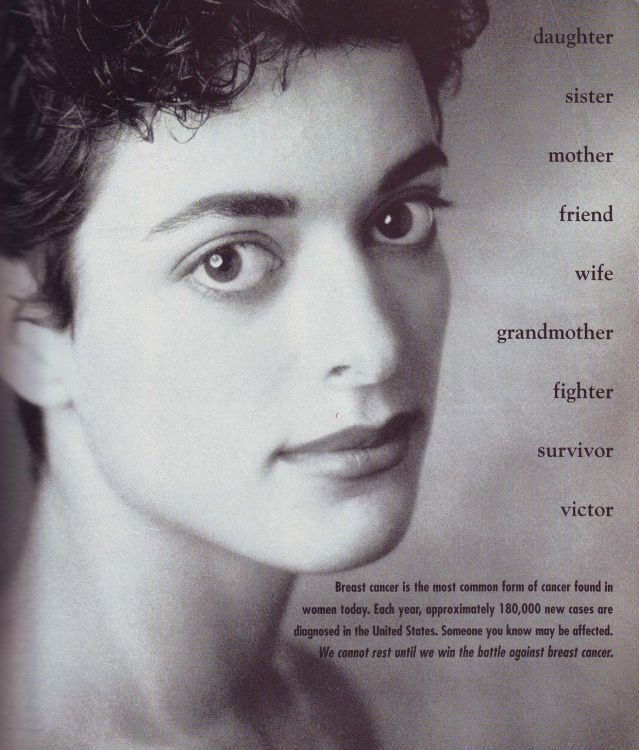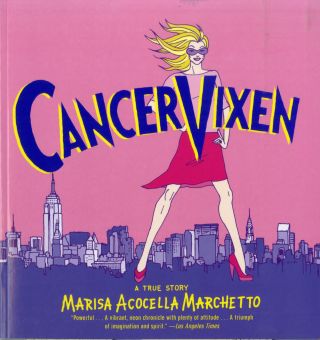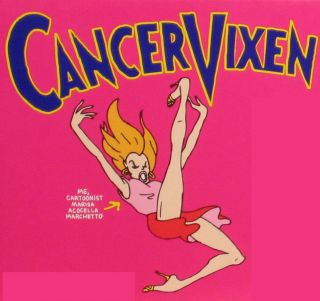Relationships
The She-ro
The protagonist of the epic breast cancer survivor story.
Posted September 29, 2013
She exists in many iterations; in magazines, advertisements, news stories, and awareness events. She is a superwoman who courageously, passionately, and aggressively battles disease. She faces tremendous difficulties. With style and optimism, she learns from her experience, is transformed, and shares lessons learned. She is the SHE-RO, the triumphant survivor who fights breast cancer and wins. Those who do not embrace her have no place in pink ribbon culture.

Breast Cancer Advertisement

Breast Cancer Advertisement

Breast Cancer Advertisement
Cancer Vixen: A She-ro Extraordinaire
Cancer Vixen is the breast cancer story of Marisa Acocella Marchetto, published first as a six-page cartoon spread in Glamour magazine and later as a book. This graphic memoir is a stylized glimpse into the cartoonist’s alter ego as she faces breast cancer diagnosis and treatment. The narrative evokes key elements of the she-ro type: inspiration, emotional drama ending in triumph, personal transformation, and a vivacious style that thrives on feminine accessories.
Keep it light and inspiring. 

Keep it light and inspiring.
Appeal to emotions with sensational drama, tragedy and triumph. Cancer Vixen rides an emotional roller coaster with tidbits of life sprinkled in between. She argues with her mother (whom she dubs “smother”); cries an ocean of tears with a gaggle of best friends; questions God (“Hey you up there, how could you make me a bald, unhealthy, baggage-ridden bride?”); and dabbles in cabala. The image of Cancer Vixen post-diagnosis, as the “Electrolux of the universe sucks [her] into a black hole,” suggests a feeling of being out of control, a melodramatic portrayal of cancer’s capacity to wreak havoc in her life as she wonders what will happen physically, emotionally, and existentially.
The she-ro trope allows only momentary contemplation as the narratives meander through difficulties, lessons, and transformations but seldom delves into the complexities of human experience. MAMM magazine pointed out that at walks and fund-raisers the women "with success stories get the podium and headlines.” Voices that stray from the triumphant storyline are not welcome.
Tell everyone breast cancer made you a better person. In focusing on triumph, she-ro stories also emphasize how breast cancer helped women to salvage failing relationships, establish new friendships, rethink priorities, gain self-confidence, get in shape, and find happiness. Cancer Vixen reinforces this message, as does Marchetto in a separate interview.
“In many ways, believe it or not, I look at the whole experience as something positive. It made me a better person, a better wife, a better daughter, a better stepmother, a better sister, a better friend, and ultimately led me to a better life.”
Major life events can ignite positive changes in people’s lives, but these are neither guaranteed nor automatic. I have never heard anyone — not even those who learned from their cancer experience — express a desire for cancer to come back so they will have more opportunites to enjoy its transformative benefits. Yet for she-roes, positive transformation and optimism go together to form the foundation of triumphant survivorship.
Dr. Jimmie Holland writes in The Human Side of Cancer that it is common for people who have survived cancer to attribute survival to positive thinking, a belief that seems to explain their "cure" while buffering fears about cancer’s return. Having positive feelings about one’s cancer experience may help some people get on with life after diagnosis and treatment. But optimism does not confer survival benefits. People who think positively get cancer and die from cancer at the same rates as people who do not.
The focus on taking charge of cancer with a positive outlook pressures the diagnosed to put on an upbeat front whether it feels authentic or not. Anna, who was diagnosed at age 33 told me, “I can’t tell you the number of times people have said to me that staying positive and happy will keep me winning my ‘battle’ with breast cancer. People always ask me how I’m feeling, but don’t really want to hear the answer, unless I’m upbeat and sunny.”
Cancer Vixen Product Line Customize your outlook with feminine aesthetics and punchy fortitude. 

Cancer Vixen Product Line
Customize your outlook with feminine aesthetics and punchy fortitude.
The valorization of the she-ro marginalizes those who do not, or cannot, live the ideal. A blogger living with metastatic (stage 4) breast cancer shared recently that she no longer has “a particular kind of hope." She said, “I can’t just mark the time and get through knowing the hardest parts will soon be over. Because I know the hardest parts are yet to come.” Unlike the she-ro, her reality is heavy and complicated. Her personal will, no matter how optimistic or feisty, will not lead to a happy ending. Her hope is for medical stability, more time with her kids, an authentic legacy. She does not think of herself as a better person, just a person living, for now, with a terminal disease.
The Problem with the She-ro

Instead of being presented as one possible way to cope with breast cancer, the she-ro is cast as the universal breast cancer survivor. Her idealized message of transformative, triumphant, trendy survivorship obscures and at times suppresses alternative ways of dealing with breast cancer as well as the fact that even she-roes can and do die from this disease.
The personally transformative power of breast cancer within she-roic representations diverts attention from the systemic factors impacting the disease such as, the current state of research, the limits of biomedicine and the health care system, and the overall lack of attention and resources going toward causation, prevention, recurrence, and metastasis (when cancer spreads to major organs of the body and becomes terminal). Commercialization, profiteering, pinkwashing, political motivations, and conflicts of interest between industry and advocacy exist outside the purview of she-roic vision. Yet these factors have played key roles in creating a reality in which we still, after thirty years of highly successful awareness and fundraising, do not know what causes breast cancer, how to prevent it, or how to keep people from dying from it.
The she-ro does not delve into such thorny issues. It is her personal success story that steals the spotlight. As the central figure of the breast cancer brand, her upbeat attitude, passion, and alleged triumph help to create a cancer-fighting aesthetic that encourages other plucky survivors and their supporters to support a multi-billion dollar pink ribbon industry as they live, laugh, love, and shop “for the cure.” The upcoming HBO film adaptation of Cancer Vixen starring Cate Blanchett will likely spread the she-roic message farther and wider as women strive to embrace, or resist, the ideal.
Dr. Gayle Sulik is the author of Pink Ribbon Blues: How Breast Cancer Culture Undermines Women's Health. More information is available on the book's website.
© 2013 Gayle Sulik, PhD ♦ Pink Ribbon Blues on Psychology Today




